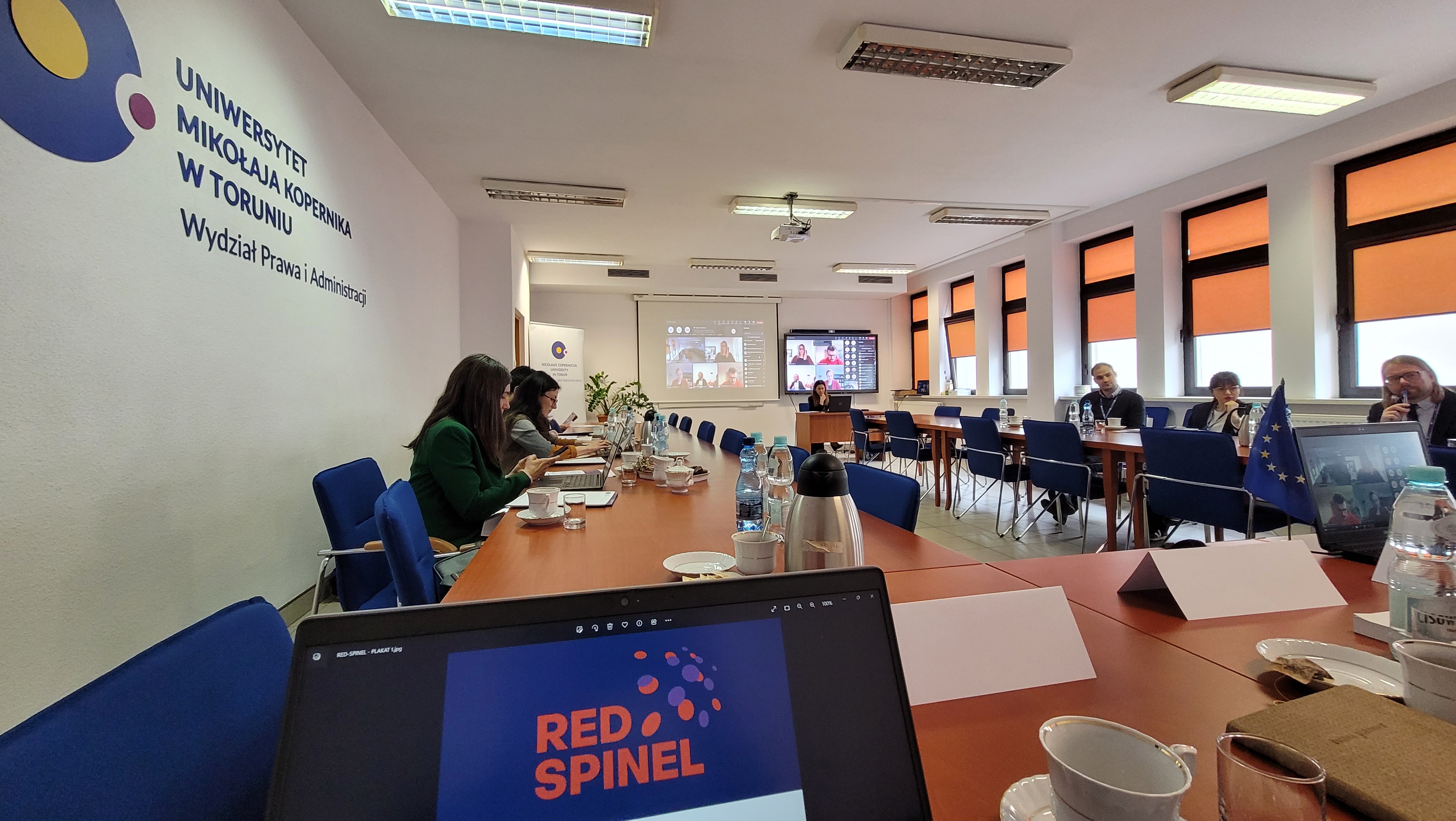Seminar on “The Compatibility of EU Law with the Rule of Law & Democratic Principles”
On 30-31st March, our seminar entitled “The Compatibility of EU Law with the Rule of Law and Democratic Principles” was held at the Faculty of Law and Administration of NCU in Torùn, Poland. The seminar provided a forum for discussing the role and place of democratic principles in the Union’s institutional law and legal order. During the meeting, the participants have for example discussed the role of EU instruments in ensuring respect for the rule of law and the problem of systematic error in the implementation of ECtHR and CJEU decisions by EU Member States. The seminar took place in the context of the working group 2 of RED-SPINEL: “EU instruments defending the rule of law within the EU”.
First Panel
Prof. Dimitry Kochenov, Dr. Barbara Grabowska-Moroz, Annalisa Volpato, Gisela Hernandez Gonzalez, Maciej Serowaniec
During the first panel Professor Dimitry Kochenov delivered a lecture on multiplication of the rule of law standards in the European Union, arguing that it can bring some negative effects. He noticed that the European Union is now really based on the rule of law and can theoretically be policed from the supranational level. He also noticed that the Court of Justice of the European Union has done its best in order to solve the problems with enforcement of rule of law, however instead of solving them, the Court has created more competences and more substantive power for itself.
Dr Barbara Grabowska-Moroz presented a part of her research dealing with the rule of law crisis at the domestic level. She discussed the abuse of comparativism in the rule of law crisis context, arguing that the abusive comparativism is used especially by Poland and Hungary which try to introduce legislative and political changes to abuse or introduce unconstitutional, unlawful purpose.
Annalisa Volpato talked about the main mechanisms to uphold the rule of law in delegation of powers. Finally, Gisela Hernandez Gonzalez during her presentation briefly discussed the role of EU instruments in ensuring respect for the rule of law and also delivered a detailed analysis of national governments positions on the enforcement of that rule.

2nd Panel
Wojciech Wloch, Adriano Dirri, Ylenia Guerra, Balázs Gaál, Lorenzo Cecchetti, Ylenia Citino
The second panel began with conceptual reflections on legalism presented in a paper entitled “Towards Constitutional Aretology: Legalism as a Virtue”. Wojciech Wloch distinguished two approaches to legalism: legalism as an ideology and legalism as a constitutional virtue. Legalism as a virtue requires those in constitutional functions to be norm-oriented, but also to be aware of the limits of such an attitude.
In the second presentation entitled “Are the EU efforts for a new conditionnality mechanism falling short?” Adriano Dirri and Ylenia Guerra examined the systemic implications and current challenges of the ongoing implementation of the EU regulation 2092/2020. Nevertheless, beyond the emphasis on the Regulation and the CJEU judgments delivered on February 2022, many issues arises, which are addressed in the second part of the paper: first, it is a new tool for EU rule of law implementation, but strictly connected to the EU budget; secondly, the adoption of the Regulation has provoked a newly interinstitutional conflict within the EU; thirdly it should be worth noting that the rule of law has been for the first time “defined” by the EU legislation and directly invoked as part of the EU constitutional identity by the CJEU.
Balázs Gaál in the paper entitled “The problem of systematic error in the implementation of ECtHR and CJEU decisions by EU Member States” argued that the implementation of domestic and international court judgments is one of the cornerstones of the rule of law. Non-compliance with court judgments is not only a sign of and, at the same time, a factor contributing to the deterioration of the rule of law, but also leads to human rights violations that are left without remedy and possibly even recurring.
The problem of the independence of the judiciary was the main theme of the presentation by Lorenzo Cecchetti and Ylenia Citino. The authors argued that over the last few years, the Court of Justice of the European Union has been at the forefront of the protection of judicial independence in the courts of the Member States across the European Union. In the well-known Associação Sindical dos Juízes Portugueses case, the CJEU clarified the connection between Article 267 TFEU, Article 19 (1) (2) TEU, the value of the rule of law stated in Article 2 TEU, and Article 47 of the Charter, which set the beginning of a long chain of decisions.
Finally, Maciej Serowaniec, during his presentation put forward three theses: firstly, the dispute over the concept of the rule of law concerns the normative meaning of the concept; secondly, the essence of this dispute lies in the use of different meanings of the term ‘rule of law’ by the conflicting parties, which is to a large extent politically motivated and therefore serves a particular, partisan purpose; third, it may be worth putting forward a moderately optimistic thesis that the dispute is reasonably resolvable.
On the second day of the seminar Cristina Fasone presented a draft of the State of the Art working document for RED-SPINEL “Established EU instruments on the rule of law”.
Maciej Serowaniec, NCU

